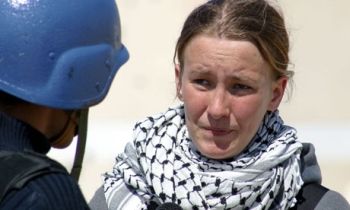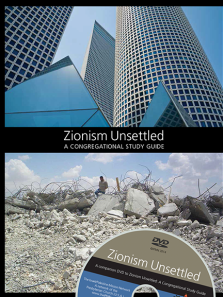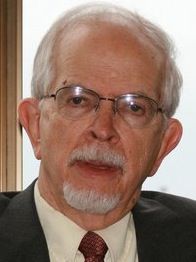
Publisher:
Bonnie King
CONTACT:
Newsroom@Salem-news.com
Advertising:
Adsales@Salem-news.com

~Truth~
~Justice~
~Peace~
TJP
Feb-26-2014 01:13

 TweetFollow @OregonNews
TweetFollow @OregonNews
'Lest We Forget' The Day Rachel Corrie Died
Dr. James M. Wall Salem-News.comMs. Corrie was a student at the Evergreen State College in Olympia, Wash.,
 Rachel Corrie in Gaza |
(CHICAGO) - Rachel Corrie was killed March 16, 2003, by an Israeli soldier who crushed her to death with an American-built Caterpillar bulldozer.
Eleven years later, March 16, 2014, on the anniversary of her death, Rachel Corrie (right) will be remembered by her family and friends.
She will also be remembered on this anniversary, by those who celebrate and cherish a young American woman who said no to Israel’s occupation and no to the constant attacks on Palestinians and the destruction of Palestinian homes.
What happened when an American citizen was killed by an Israeli soldier driving an American-built bull dozer? Mother Jones had Israel’s official reaction in 2003:
- “The Israeli government, which rarely acknowledges the deaths of Palestinian civilians killed during its military operations, went into damage-control mode. Prime Minister Ariel Sharon promised President Bush a “thorough, credible, and transparent investigation.” Later Israel declared the killing a “regrettable accident” and blamed it on overzealous Corrie and the other activists working as human shields.”
Subsequent calls for Congress to investigate Rachel Corrie’s death were ignored. A civil lawsuit brought by her family against the Israeli military, was introduced in Israeli courts, March 15, 2005. The Israeli justice system responded slowly.
Seven years after the suit was filed, and nine years after Rachel Corrie’s death, an Israeli court reached a final verdict. Robert Mackey, a New York Times blogger reported:
- As my colleagues Jodi Rudoren and Danielle Ziri report, an Israeli judge ruled on Tuesday that the state bore no responsibility for the death of Rachel Corrie, an American activist who was crushed to death by a military bulldozer in 2003 as she tried to block the demolition of a Palestinian home in Gaza.
- Ms. Corrie, who was a student at the Evergreen State College in Olympia, Wash., joined the pro-Palestinian International Solidarity Movement in January 2003, and was killed two months later in the Gazan town of Rafah, which straddles the border with Egypt.
- Photographs published by The Electronic Intifada on March 16, 2003, the day she died, showed that Ms. Corrie confronted heavily armored bulldozers that day wearing a bright orange vest and, until a few minutes before her death, using a bullhorn to amplify her voice. The same Web site also published sworn affidavits recorded within days of the deadly incident by three other international activists who were present when Ms. Corrie was killed.
 |
- One of those witnesses, a Briton named Tom Dale, sent the following statement to The Lede on Tuesday from Cairo, where he now works as a journalist:
- “The verdict in Rachel’s case is saddening for all those who knew Rachel, and for all who believe in what she stood for. It should be disappointing for all those who want to see justice done in Israel and Palestine.
- On March 16, 2003, Rachel could not have been more visible: standing, on a clear day, in the open ground, wearing a high visibility vest. On that day, she had been in the presence of the Caterpillar D9 bulldozers used by the Israeli army for some hours.
- She was standing in front of the home of a young family which was under threat of demolition by a bulldozer. Many homes were demolished in such a way at that time, and Rachel was seeking to protect her friends, with whom she had lived.”
In the picture at right above, shocked friends from the International Solidarity Movement try to revive a dying colleague. The blue bull dozer continues on its mission to destroy a Palestinian family home.
The juxtaposition of the anniversary of Rachel Corrie’s death and AIPAC’s annual Policy Conference, March 1-4, is repeated each year in Washington, DC. It is a coincidence of timing that epitomizes our nation’s shame.
American media rarely takes note of the March 16 anniversary of Rachel Corrie’s death. But it will provide ample coverage of AIPAC’s annual celebration of the long time love affair between Israel and the U.S. Congress.
Over 400 members of Congress are expected to attend this year’s conference. Some of the representatives and senators will be granted the honor of gaining additional media exposure when speaking to the assembled AIPAC members..
In return for their unswerving obsequiousness, these members of Congress pocket campaign cash contributions and perhaps more importantly, they take home a guaranteed AIPAC PPP (political protection plan).
The plan protects incumbents against primary opponents. The plan also guarantees campaign strategists who comb an opponent’s record for the slightest action or statement available to reshape and brand with the deadly anti-semitic designation.
Religious groups, like the Presbyterian Church USA’s Israel Palestine Mission Network (IPMN), operate without the protection of AIPAC’s political protection plan. So it was that when the IPMN produced an excellent and well-researched study guide (complete with DVD), appropriately named Zionism Unsettled, a storm of protest rose against them.
Modern Israel’s claim to the lands of Judea and Samaria is rooted in a political ideology called Zionism, a political movement formed in the late 19th century. It is not a biblical promise from the time of Jesus.
 |
The Zionism Unsettled study guide has both Christian and Jewish Zionists “unsettled”.
Chris Leighton, Executive Director of the Institute for Christian and Jewish Studies, produced an “open letter” on February 6, attacking his fellow Presbyterians for not uniting Zionism and Judaism..
He begins:
- The Israel Palestine Mission Network (IPMN) and their allies have once again mounted initiatives that advance an extremist posture with respect to the Palestinian-Israeli impasse. Their agenda threatens to polarize our community, betray relationships with our Jewish colleagues, and ultimately undermine our credibility as “peacemakers.”
Brant Rosen, a congregational rabbi from Evanston, IL, began his response to Leighton on Rosen’s blog, Shalom Rav:
- I believe your characterization of my sacred tradition is incorrect – and dangerously so. It is prejudicial in the extreme to equate Zionism with Judaism itself.
Zionism – that is, the movement to create a Jewish nation-state in historic Palestine – is in fact a political movement that was born in 19th century Europe.
- As such, it was a conscious and radical break with centuries of Jewish tradition that strongly cautioned against the establishment of an independent Jewish state in the land.
- While it is certainly true, as you write, that the yearning for a “return to Zion” is suffused throughout Jewish tradition, it is important to note that this yearning was pointedly directed toward a far off messianic future.
Rabbi Rosen closed his blog posting:
- At the very least, there is a growing desire to allow non-Zionist voices to be part of the Jewish communal debate once more.
- One notable bellwether of this phenomenon may be found in the Swarthmore Hillel student board’s recent unanimous decision to defy the guidelines of Hillel International and declare itself an “Open Hillel.” In a statement accompanying their resolution, these Jewish students noted:
- “All are welcome to walk through our doors and speak with our name and under our roof, be they Zionist, anti-Zionist, post-Zionist, or non-Zionist. We are an institution that seeks to foster spirited debate, constructive dialogue, and a safe space for all, in keeping with the Jewish tradition.”
- I trust you would never suggest that these Jewish students are driven by “anti-Semitism.” On the contrary, they are clearly motivated by sacred Jewish values and a courageous refusal to reduce Jewish identity to one political ideology.
The usually cautious J Street, which wants to be a friendly version of AIPAC, also weighed in against IPMN’s study guide. Ali Abunimah covered J Street’s surprisingly unfriendly reaction to Zionism Unsettled.
- The Israel lobby group J Street has launched a blistering attack on the Presbyterian Church USA over its new study guide Zionism Unsettled, claiming that the publication promotes “polarization” and “intolerance.”
- Zionism Unsettled, published last month by the church’s Israel/Palestine Mission Network (IPMN), is a 74-page study guide examining the role Zionism and Christian Zionism have played in shaping attitudes and events in Palestine and its region.
- It is intended to help church congregations and others to learn and talk about Zionism and the devastating impact the practice of the ideology has had on Palestinians, as The Electronic Intifada previously reported.
- In a statement yesterday, J Street said it was “deeply offended” by Zionism Unsettled, asserting that “one has to question the IPMN’s motives in publishing this ‘resource.’”
- J Street claimed the guide’s authors “had no intention of encouraging thoughtful reflection on Zionism, the Israeli-Palestinian conflict, or Jewish perspectives on Israel. Instead, reductive and divisive thinking of this kind exacerbates polarization and intolerance, both of which are not in short supply in this conflict.”
When even the usually cautious J Street feels the need to vilify a highly respected Christian group like IPMN, it becomes obvious that the false linkage of Zionism, a political ideology, with classical religious Judaism, is a sagging reed on which the Zionists now attempt to lean.
Zionism Unsettled explains why that sagging reed will no longer bear the weight Zionists put upon it.
Rudyard Kipling wrote his poem, Recessional, on the occasion of Queen Victoria’s Diamond Jubilee in 1897.
Wikipedia reminds us that “The poem defied the celebratory mood of the time, offering instead a reminder of the transient nature of British Imperial power.
In the poem, Kipling argues that boasting and jingoism, faults of which he was often accused, were inappropriate and vain in light of the permanence of God.”
The first four verses of the poem repeat the line, “Lest we forget, Lest we forget”. The poem is often sung as a hymn in Christian churches.
Rachel Corrie was defying an American/Israeli empire when she stood against the destruction of a Palestinian home on March 16, 2003.
Here is verse three from Kipling’s Recessiona:
- Far-called, our navies melt away;
On dune and headland sinks the fire:
Lo, all our pomp of yesterday
Is one with Nineveh and Tyre!
Judge of the Nations, spare us yet,
Lest we forget—lest we forget!
Rachel Corrie, “lest we forget, lest we forget”.
http://wallwritings.me/2014/02/24/lest-we-forget-the-day-rachel-corrie-died/
Please visit James Wall's Website, Wall Writings
 Journalism was Jim Wall’s undergraduate college major at Emory University, Atlanta, Georgia. He has earned two MA degrees, one from Emory, and one from the University of Chicago, both in religion. An ordained United Methodist clergy person; he and his wife, Mary Eleanor, are the parents of three sons, and the grandparents of four grandchildren. They live in Elmhurst, Illinois.
Journalism was Jim Wall’s undergraduate college major at Emory University, Atlanta, Georgia. He has earned two MA degrees, one from Emory, and one from the University of Chicago, both in religion. An ordained United Methodist clergy person; he and his wife, Mary Eleanor, are the parents of three sons, and the grandparents of four grandchildren. They live in Elmhurst, Illinois.
Jim served for two years on active duty in the US Air Force, and three additional years in the USAF (inactive) reserve. While serving with the Alaskan Command, he reached the rank of first lieutenant. He has worked as a sports writer for both the Atlanta Journal and Constitution, was editor of the United Methodist magazine, Christian Advocate for ten years, and editor and publisher of the Christian Century magazine for 27 years, starting in 1972. Time magazine wrote about the new editor, who arrived at the Christian Century determined to turn the magazine into a hard-hitting news publication. The inspiration for Wall Writings comes from that mindset and from many other sources that have influenced Jim’s writings over the years, including politics, cinema, media, American culture, and the political struggles in the Middle East. Jim has made more than 20 trips to that region as a journalist, during which he covered such events as Anwar Sadat’s 1977 trip to Jerusalem, and the 2006 Palestinian legislative election. He has interviewed, and written about, journalists, religious leaders, political leaders and private citizens in the region. You can write to Jim Wall at jameswall8@gmail.com. Visit Jim's Website: Wall Writings
 |
 |
 |
Articles for February 25, 2014 | Articles for February 26, 2014 | Articles for February 27, 2014



Salem-News.com:


Terms of Service | Privacy Policy
All comments and messages are approved by people and self promotional links or unacceptable comments are denied.
[Return to Top]
©2025 Salem-News.com. All opinions expressed in this article are those of the author and do not necessarily reflect those of Salem-News.com.